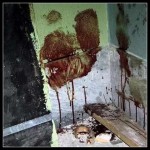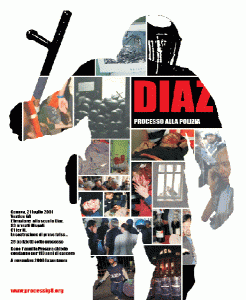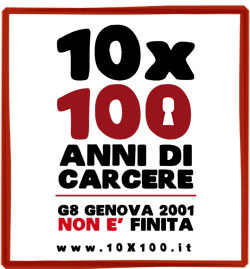 Der Oberste Gerichtshof Italiens hat gestern die Urteile gegen die Polizeiführer bestätigt, die an der „chilenischen Nacht“, dem brutalen Überfall auf AktivistInnen beteiligt waren, die gegen den G8-Gipfel in Genua 2001 protestiert hatten. Sie wurden wegen der Fälschung von Beweisen verurteilt und weil sie nachweislich gelogen hatten. Kaum einem war Körperverletzung, niemandem Mordversuch nachweisbar, weil alle Beamten maskiert waren und sich gegenseitig bis heute decken.
Der Oberste Gerichtshof Italiens hat gestern die Urteile gegen die Polizeiführer bestätigt, die an der „chilenischen Nacht“, dem brutalen Überfall auf AktivistInnen beteiligt waren, die gegen den G8-Gipfel in Genua 2001 protestiert hatten. Sie wurden wegen der Fälschung von Beweisen verurteilt und weil sie nachweislich gelogen hatten. Kaum einem war Körperverletzung, niemandem Mordversuch nachweisbar, weil alle Beamten maskiert waren und sich gegenseitig bis heute decken.
 Vier Jahre für Giovanni Luperi und Francesco Gratteri (der Italiens nächster Polizeichef werden sollte), fünf Jahre für Vincenzo Canterini, drei Jahre und acht Monate für Gilberto Caldarozzi, Filippo Ferri, Fabio Ciccimarra, Nando Dominici, Spartaco Mortola, Carlo Di Sarro, Massimo Mazzoni, Renzo Cerchi, Davide Di Novi und Massimiliano Di Bernardini.
Vier Jahre für Giovanni Luperi und Francesco Gratteri (der Italiens nächster Polizeichef werden sollte), fünf Jahre für Vincenzo Canterini, drei Jahre und acht Monate für Gilberto Caldarozzi, Filippo Ferri, Fabio Ciccimarra, Nando Dominici, Spartaco Mortola, Carlo Di Sarro, Massimo Mazzoni, Renzo Cerchi, Davide Di Novi und Massimiliano Di Bernardini.
Sie werden dafür nicht sitzen. Es ist ein Wunder, sagen alle, die mehr von der italienischen Justiz verstehen, dass es überhaupt zu den Urteilen kam. Sie werden ihre Posten verlieren und fünf Jahre nicht im Öffentlichen Dienst arbeiten können. Kein Vergleich, aber für diese Männer, die nach dem G8 auf noch höhere Posten geschubst wurden, sicher nicht, was sie erwartet hatten.
Für nächste Woche wird mit einem weiteren Urteil gerechnet. 10 italienische AktivistInnen, die nach dem G8-Gipfel ziemlich wahllos mit Gerichtsverfahren überzogen wurden, werden voraussichtlich zu insgesamt 100 Jahren Haft verurteilt werden. Und sie werden diese Urteile sicher absitzen müssen. Dabei tragen sie – im Unterschied zu den oben genannten – keine Verantwortung für hunderte Verletzte, von denen einige tagelang im Koma oder sonst schwer verletzt im Krankenhaus lagen. Während andere mit schweren Verletzungen aus dem Krankenhaus abgeholt und zu hunderten anderen in eine Kaserne gebracht wurden und dort tagelang gefoltert wurden. Ohne das irgendjemand wusste, wo sie waren.
 Es gibt eine Kampagne für die 10, die übrig geblieben sind: 10 x 100 Jahre Knast – G8 Genua 2001 ist noch nicht vorbei, 10×100.it. Dort werden Unterschriften gesammelt.
Es gibt eine Kampagne für die 10, die übrig geblieben sind: 10 x 100 Jahre Knast – G8 Genua 2001 ist noch nicht vorbei, 10×100.it. Dort werden Unterschriften gesammelt.
Blicero, der wie ich im Juli 2001 im Medienzentrum der Gipfelproteste saß, hat das Urteil so kommentiert:
(…) But the story of the raid has already ended 11 years ago: its mindlessness; the arrogance of those who ordained it looking for vengeance and spreading violence on helpless people sleeping, trying to appease the political and “street” humiliation they had to endure during Genoa days; it’s all been there for a long time. History is not made by judges. Courts are part of the institutions and at the very most can acknowledge a side of the story people live (and everybody knows a lot of facts are not at all relevant for courts). We are history. History is what people felt and lived there that night. It’s what people told over and over these years, and it’s much more frightening than a bunch of year of conviction sown for lack of better ways to deal with what happened. It’s much more than the consolation of (maybe) seeing the accused people thrown out of what they care most for (the corps, the honour). History it’s what all the people mesmerized by the images and sound of their tv screen will never forget, aghast and ashamed of the feeling they clearly had of how feeble and faint democracy is in front of the absolute need of power not to be discussed or (worse) fought.
Are we (the ones who were there with me) satisfied? I guess so: so many years of our lives spent to wrestle at least a sodding paper to be waved under the nose of those who still won’t believe plain truth. But still all this won’t make a difference next week, when 10 people could be convicted by the Supreme Court to more than 100 years of jail, accusing them of all the things that happened in those days in genoa. They were there, of course. As I was. As we were. And Genoa was all of us. But it will be those 10 people to pay for it. And to pay dearly, while most of us will just stare still. I would have gladly traded a clumsily camouflaged coup to have the high ranking cops get away clean with an acquittal next week. But it won’t be so. And it will be so many years to not leave alone those who will pay for my struggle as well. For our struggle.
„La storia siamo noi“ – die Geschichte haben wir geschrieben.

die mischung aus wut und angst und schrecken und hilflosigkeit, die mich jedesmal überfällt, wenn ich an genua denke, dreht mir buchstäblich den magen um.
das thema ist m.e. nicht publik genug. italien ist echt mal um die ecke und ich wette, dass in meinem bekanntenkreis nicht mal 10 prozent jemals etwas davon gehört haben. nur so kann ich es mir erklären, dass sich eine horde polizisten in der mitte europas einem gewaltrausch hingeben können und dann quasi straffrei davonkommen.